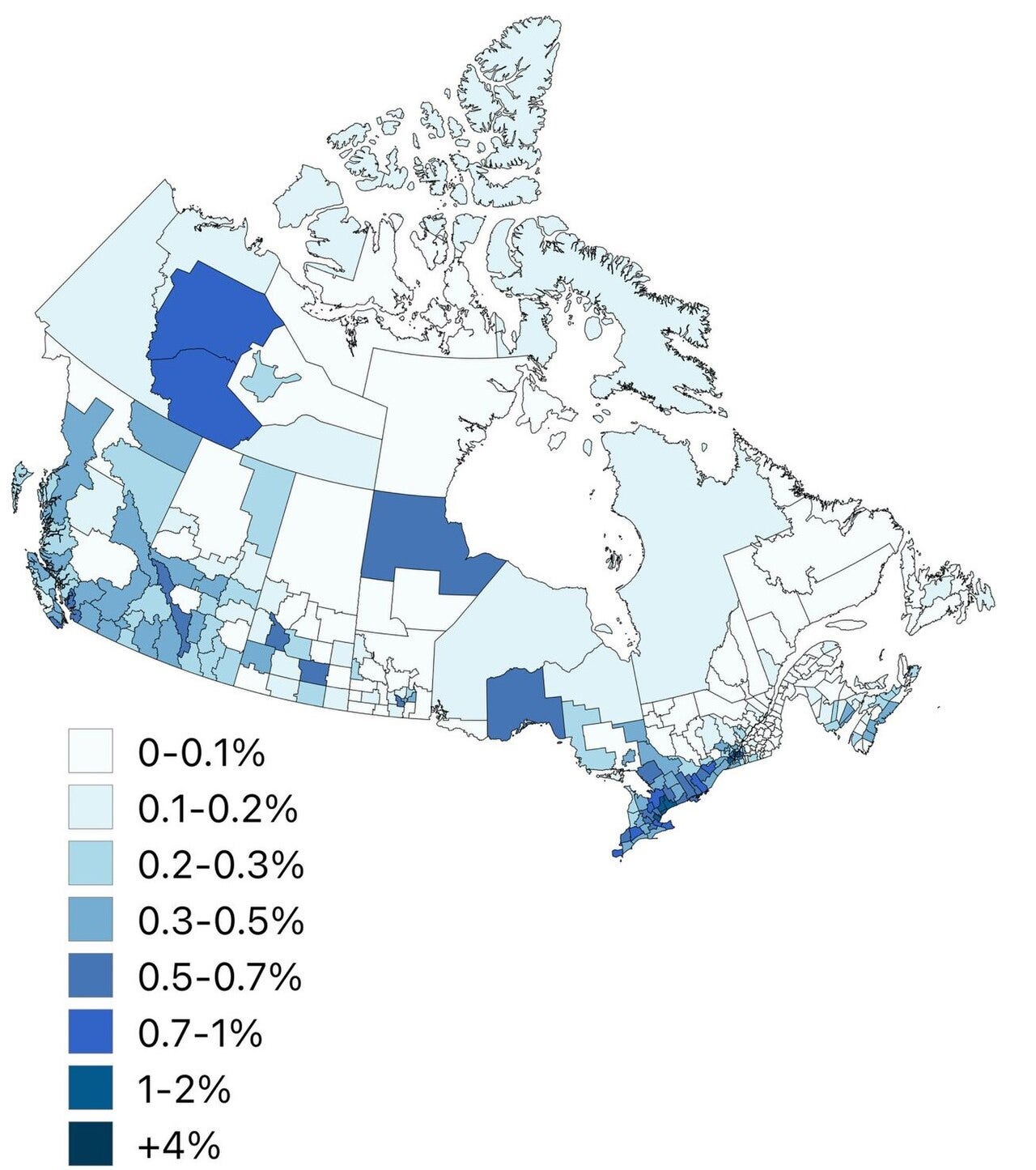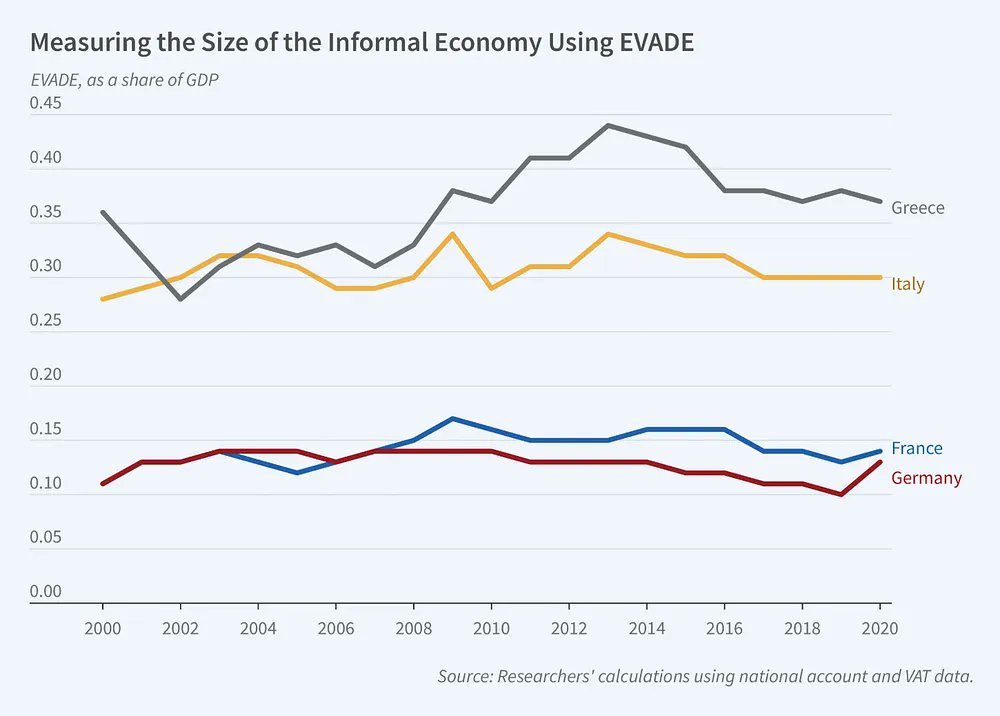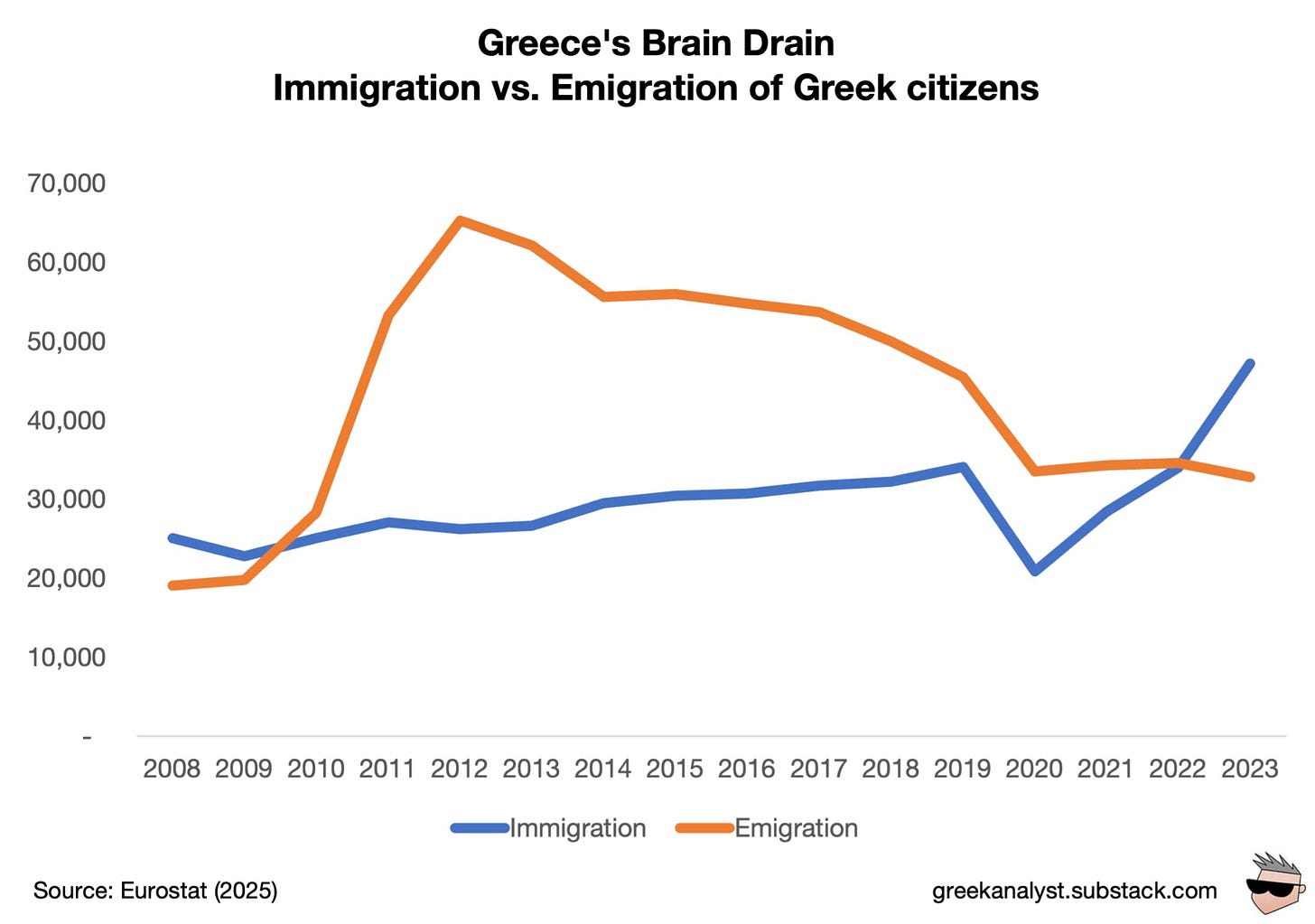Welcome to the 46 awesome new readers who joined us in the past week!
If you haven’t subscribed, join 3,538 smart, curious people interested in Changing Greece.
🇬🇷🧠 Greece's brain drain finally reversing
I never thought I would live to see the day.
It’s pretty remarkable, really.
2023 was the year that Greece finally reversed its brain drain.
So… what now!?
From “brain drain” to “brain (re)gain”
According to the latest data from Eurostat, in 2023 immigration of Greek citizens back to Greece surpassed emigration to other countries for the first time since the crisis started.
Greece recorded its lowest emigration flows (32.8k Greek citizens leaving) since 2010 and its largest immigration flows (47.2k Greek citizens returning) on record.
I recently talked about this in the context of my Greek economic myth-busting article.
Some people might fret. Others will try to find 100 different excuses to deny this is even happening. But the reality is clear: more Greeks are coming back to Greece today than are leaving it. And that’s an important reversal of fortunes for our country.
The data has been pointing towards this direction for a number of years. Moreover, there have been many anecdotal examples of people who chose to move back — especially after COVID hit, social media were full of such stories.

Obviously, this does not change the fact that many Greeks are still opting to leave the country. This is still an important, undeniable fact. Many people believe that we should focus more on finding ways to reduce these outflows. But why would we ever want to stop Greeks from leaving the country?
Smart Greeks go abroad, experience amazing things, receive better skills, learn from the top experts in their fields, build strong relationships, work in the best companies in the world, make some good money, and importantly, build higher standards about what they expect from themselves and from a well-functioning society.
We should want more people to leave the country, not less.
The problem is not Greeks leaving. The main issue is bringing back as many of them as possible while letting those that prefer to live abroad thrive on a global level, and connect those two parts in a way that adds value for everyone.
How do we do that?
From “Rebrain Greece” to “Reimagining Greece”
To be clear: what we are talking about here is the reversal of the trend of Greek brain drain, not a turn-around in absolute figures. Hundreds of thousands of Greeks have left the country since 2009 and still remain abroad. It will be extremely hard to win most of them back. Many will just never choose to do so. But…
Bringing everyone back to Greece cannot and should not be the objective.
Why it cannot be the objective (pragmatic POV): Diaspora groups are not monolithic. A large portion of Greek emigres have already built their lives abroad — they have started families (often with foreign spouses), found well-paying jobs and spent years trying to fit in. Many of them have also experienced significant injustice while still in Greece only to find themselves in conducive environments abroad that provided them with all the opportunities they needed to flourish. No matter how much Greece improves for the better (and we all know it will not become Switzerland overnight), these people have already decided long ago that they are not interested in coming back any time soon. We need to accept that.
Why it should not be the objective (strategic POV): The large Greek diaspora is one of the country’s greatest strengths. Greece needs as much of its soft power abroad as it can get, especially in these geopolitically troubled times. It also must allow diaspora Greeks to get as much out of their experience abroad as possible before they ever decide to come back. All the amazing Greeks living, working and thriving abroad should be seen as valuable assets and a powerful influencing factor at a time when old global alliances are tested and new ones are being forged.
A few years ago, the Greek government created Rebrain Greece, an initiative with an inspiring and valiant goal: bring back to Greece some of the top minds that left the country during the crisis. There are many parts involved, but the most relevant one is regular visits by Greek Ministers and representatives of large Greek employers to countries with large clusters of diaspora Greeks. In theory, it is a pretty cool concept.

In practice, many young people feel very distrustful towards the initiative and the claims made by the government’s representatives (see here, here and here). I find many of the comments unfair (and in some cases, full of clear ideological biases or even partisan colours). And yet, there are also many legitimate concerns about how this initiative is set up and marketed. And of course, many of the jobs promoted are sadly not as amazing as advertised or pertain to companies with cultures that will never be able to attract serious talent from abroad (and help them stay for good).
The key to repatriation is making Greece progressively better. Fixing public institutions, closing the gap with the rest of the EU, increasing the number and quality of opportunities for younger people and making the system more fair for everyone. That’s what most Greeks abroad care about in order to return.

But that’s not what I want to focus on today. I actually believe there are many good intentions and caring people behind the Rebrain initiative. I also see it as part of a series of multiple necessary steps to stop the “bleeding” of talent.
Rather, I want to talk about something altogether different: a change in our mentality.
It’s time for Greece to transition from actively trying to bring Greeks back to redefining their sphere of influence on a global level.
Governmental visits from Rebrain Greece might be useful to an extent, but they should not be expected to move the needle in the large scheme of things. Diaspora Greeks that do not want to return will probably not change their minds, while those that do want to return will end up doing so regardless of any governmental promotional visits.
My proposal: let’s turn the Rebrain initiative into a Reimagination movement.
We need to think less about repatriation as a single and unwavering objective, and more about how we can build a dynamic, transnational and united community based on Greek cultural heritage that exists all across the globe.
Time to think big.
Activating the large Greek diaspora
The Greek global diaspora population is estimated at about 5 million. That’s a pretty spectacular number given that the entire population of Greece is about 10 million.
There are many important countries around the world that are full of Greeks.
Let’s look at some of them:
United Kingdom

United States

Germany

Canada

Australia

Evidently, there are a ton of Greeks out there. But what’s the best way for all of them to come together? And what can we do to enable that?

Nation-building takes place both in and out of a country, and diaspora groups play a key role in that. Political scientist Harris Mylonas has written extensively about the topic of diaspora management and how it affects the geo-strategic power of countries. So has Jennifer Cavounidis, primarily on the potential of the new Greek diaspora. Deon Policy Institute’s work on the wider Hellenic diaspora and SEESOX’s Greek diaspora project are also two very important contributions to the discourse.
Here are a few critical policy priorities that Greece should be focusing on:
Creating dedicated global/local diaspora institutions. The Rebrain platform is a great first step, but it is time to create a more structured and long-term way of communicating with the large (permanent) Greek diaspora. Repatriation should obviously be part of it, but not the exclusive focus. While the Greek Minister of Foreign Affairs (MFA) can be involved, this should be an organization that can also act independently. We need more and better connecting nodes between Greece and the rest of the world.
Facilitating the process to (dual) citizenship. Receiving Greek citizenship is a notoriously difficult process, even for the most well-prepared and enthusiastic diaspora Greeks. There is an incredible number of expats and people of Greek origin that want to become Greek citizens (or help a family member, usually a child or spouse, to get their citizenship). Most of them are either unable to even start the process, or caught in an insane web of bureaucratic barriers that moves slow or even non-existent speeds. This needs to change asap.
Integrating the diaspora in broader foreign policy goals. Effective diaspora strategies are most successful when they can become part of a global foreign policy framework. This is already happening to a certain extent with the very successful Hellenic American Leadership Council (HALC) in the United States, with some similar efforts having started in in EU/UK. But much more needs to be done, and so far there has been little effort from the MFA to coordinate the many different diaspora populations across the world.
A call to action
So… what now?
Over the past decade, we’ve talked a lot about Greece’s brain drain. Gradually, we started talking about the potential of brain (re)gain too. Focusing on the latter is certainly an improvement over the former.
And yet, we need to push our thinking one step further.
We need to stop thinking in binary terms (in/out of Greece, leaving/returning). We need to reimagine the role and potential of Greece on a global level.
This is a call to action not only for policymakers, but for every person of Greek heritage around the world, regardless of their age, profile or location.
It is time to embrace a future where our contributions can collectively shape a more influential and globally connected Greece. A future where Greeks can work together and build a greater entity regardless if we are based in-country or abroad.
There is more to Greece than meets the eye. And that something is centered in our homeland, but scattered around the world, ready to flourish.
If the concept of a “global Greek” speaks to your heart, please help me spread the word by sharing this article with other people that you believe will benefit. There are more of us out there than we tend to think. Time for everyone to come closer together.
🏭 Economy & Business

Greece's informal (shadow) economy is estimated at 36% of GDP, the highest number across Europe (see here for a deep-dive I published last year)
Private deposits of households and corporations crossed €200B euros in Dec 2024 for the first time since 2011, saw seasonal reduction in Jan/Feb 2025
Get your visa by investing in a Greek Alternative Investment Fund (AIF) — the next version of the Golden Visa program (which imho should be scrapped altogether)
European Commission issues positive assessment of Greece's €3.13B payment request under NextGenerationEU
Greece will reach EU GDP level before 2045, predicts BoG governor
Greece imports no LNG in April for the first time in five years
Manufacturing sees strongest growth in nearly a year
🤖 Tech & Startups
FIRST® Tech Challenge Greece 2025 — this is where the future of our country lies
Lack of strategic direction and state barriers are key impediments to research, according to the former President of the National Council for Research, Technology and Innovation (NCRTI) who resigned from his position in protest earlier this year
Kos Biotechnology Partners is the first investment firm in Greece that invests exclusively in the biotechnology and life sciences space (and they’re hiring!)
Revolut surpassed 1.5 million users in Greece, with +130k of them having invested over €240M in money market funds with the app
Blueground’s new products and future plans
The Greek biotech sector — insights from a roundtable with experts
“I would return to Greece if…” — reasons for Greek scientists to come home
🙌 Celebrating Greek wins

Kostas Kavvathas (In Memoriam) shifted the way Greeks think about automobiles and defense with seminal publications such as 4 Wheels, Flight & Space and many others
Nicky Goulimis, a serial entrepreneur from abroad, on why she believes in the power of Greek entrepreneurship and is joining Dragon’s Den Greece to support it
Eleni Geroulanou talks about the power of reading, after having helped provide more than 1 million books to 9,000 schools across Greece in the past decade
📣 Greeks hiring: Coolest jobs out there
Various Engineering roles @ Aisera, Athens/SF (Greece/US)
Various roles @ J.P. Morgan, Athens (Greece)
Junior/Mid-Level Software Engineer @ Elyos Energy, London (UK)
Technical Account Manager @ Amazon AWS, Athens (Greece)
Senior Performance Marketer @ Skroutz, Athens (Greece)
Head of Implementation @ Base.com, Athens (Greece)
4 PhDs @ Horizon EU MSCA Doctoral Network PATRON (Belgium/Italy)
PhD & PostDoc positions on AI @ VUB, Brussels (Belgium)
That’s it for today! If you enjoyed today’s newsletter, please let me know with a like or reply. And if you value my content each week, consider pledging your support. Thanks!









Two articles worth reading at the intersection of Greece's brain drain, brain regain & diaspora:
Greece's journey from 'Brain Drain' to 'Brain Re-Gain' https://ethantchandler.substack.com/p/greeces-journey-from-brain-drain
Μήπως κερδίζουμε από το brain drain; https://www.kathimerini.gr/opinion/562839982/mipos-kerdizoyme-apo-to-brain-drain/
This is a complicated subject, no easy answers to be found anywhere. However, the huge salary gap is the main driving factor for leaving Greece in the frst place, also for not coming back. As you presented in your previous article last week (if I recall correctly) the gap with Europe is widening. It would be very interesting if we could see some data about what jobs are doing those who return, salary ranges etc.